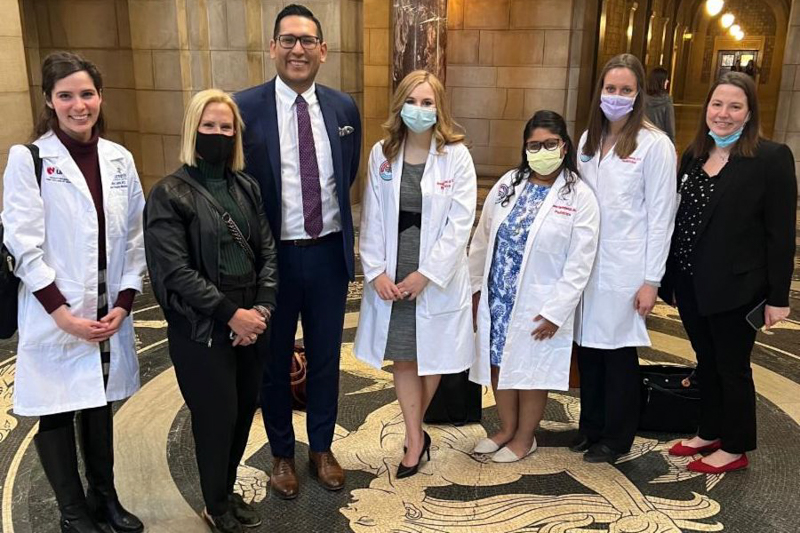Home
—
College of Medicine
—
Department of Pediatrics
—
Residency
—
Residency Tracks
—
Public Health Justice Track
Public Health Justice Track

Providers need to understand the dynamics of the patient population they will be serving and use their voice and expertise in community-scale efforts to advance health for all.
Omaha needs pediatric providers who are up to that task. We, therefore, need to enhance the educational and leverage the clinical opportunities we have.
Program Goals
To provide educational and clinical opportunities that will prepare graduates of the pediatric and med/peds residency program to:
- Be primary care providers well versed in the care and needs of underserved pediatric populations with higher exposure to social influences on health.
- Participate in public health work in their communities through research, advocacy and/or practice.
Year 1
Year 2
Year 3
Intro to health equity, health justice, social determinants of health (SDOH) and maternal child health (MCH). This will be given in a series of 3 lectures delivered by Drs. Delair, Stoolman, and Abresch:
- Social Determinants of Health: History of Healthcare Access and Delivery in Omaha for Marginalized Populations (Stoolman)
- Social Determinants of Health: Applications of Health Justice in Clinical and Research Activities (Delair)
- Health Equity/Justice and MCH Frameworks (Abresch)
- Residents officially join the track beginning in year 2
- Completion of 1 month of outpatient pediatrics in the division of general pediatrics
- Skill: primary care for the urban medically complex child and/or underserved child at an urban serving medical center
- Completion of 1-month Advocacy Elective in the Department of Internal Medicine/ Pediatrics/Pediatric Hospital Medicine
- Developed, coordinated and run by Dr. Allison Ashford, Associate Professor, Internal Medicine/Hospital Medicine and Pediatrics/Pediatric Hospital Medicine in conjunction with director of Advocacy and Government Affairs at Children’s Nebraska.
- The purpose of the advocacy rotation is to train residents to understand and apply advocacy competencies so they can be influential leaders in public policy, community and patient-family advocacy.
- Track residents will:
- Develop a tool kit of advocacy skills that can be applied in any community
- Use advocacy to advance the health of individual patients/families
- Identify and establish community-based partnerships
- Describe and participate in the legislative process
- Use activism and advocacy to explore a topic or learn more about a local organization
- Dedicate concentrated time for project implementation and evaluation
- Track residents will apply these skills to develop advocacy materials (e.g., a policy testimony statement, a grand-rounds style presentation for delivery with colleagues and the community, a research project, etc.).
- Lead Health Justice Journal Club
- Open to all residents and medical students and led by track participants
- Occurs every four months (three sessions per year SEPT, JAN, APRIL) and held at an off-campus site.
- Completion of 1 month of outpatient community pediatrics at community partner whose practice includes > 50% underserved children/adolescents
- Skill: primary care for the urban underserved child in metropolitan Omaha
- Sign up to complete the fall session of CPH 539 - Public Health Leadership and Advocacy (3 credit hours completed)
- Skill: Academic intro to Public Health Leadership and Advocacy
- Attend a CityMatCH event
- Residents will have the opportunity to attend a CityMatCH event, which could include: an in-person CityMatCH training with local health departments, the annual CityMatCH conference, or the annual weeklong training in MCH Epidemiology. (Note: residents will arrange their schedules to coordinate with their selected event, taking the elective Public Health rotation during the month of the event.)
- Lead Health Justice Journal Club
- Open to all residents and medical students and led by track participants
- Occurs every four months (three sessions per year) and held at an off-campus site.
- Continue to develop and implement activities initiated in the Advocacy elective (e.g., a policy testimony statement, a grand-rounds styled presentation for delivery with colleagues and the community, a research project, etc.).
- In this year, the resident should progress from learning and initial development to preliminary implementation of activities (i.e., becoming “active” in the community in their selected focus area).
- Participation in community support activities based on community offerings
- Participate in yearly Black Family Health fair
- Participate in yearly Binational Health fair
- Other advocacy/community engagement to be determined based on community needs (to be determined)